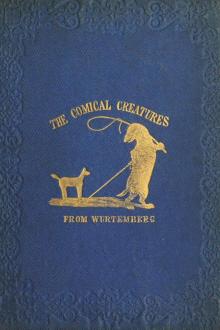The World of Ice by R. M. Ballantyne (reading eggs books TXT) 📗

- Author: R. M. Ballantyne
Book online «The World of Ice by R. M. Ballantyne (reading eggs books TXT) 📗». Author R. M. Ballantyne
The audience felt some fears for Ben Bolt at this point, but their delight knew no bounds when, shaking the Giant off, and springing backwards, he buttoned up his coat and roared, rather than said, that though he were all the Blunderbores and Blunderbusses in the world rolled together, and changed into one immortal blunder-cannon, he didn’t care a pinch of bad snuff for him, and would knock all the teeth in his head down his throat. This valorous threat he followed up by shaking his fist close under the Giant’s nose, and crying out: “Come on!”
But the Giant did not come on; he fortunately recollected that he owed his life to the brave sailor, so he smiled, and, saying he would be his friend through life, insisted on seizing him by the hand and shaking it violently. Thereafter he took Ben Bolt and Whackinta by their right hands, and, leading them forward to the foot-lights, made them a long speech to the effect that he owed a debt of gratitude to the former for saving his life which he could never repay, and that he loved the latter too sincerely to stand in the way of her happiness. Then he joined their right hands, and they went down on one knee, and he placed his hands on their heads, and looked up at the audience with a benignant smile, and the curtain fell amid rapturous cheers.
In this play it seemed somewhat curious and unaccountable that Whackinta forgot to enquire for her demolished baby, and appeared to feel no anxiety whatever about it; it was also left a matter of uncertainty whether Ben Bolt and his Esquimaux bride returned to live happily during the remainder of their lives in England, or took up their permanent abode with Blunderbore; but it is not our province to criticise—we merely chronicle events as they occurred.
The entertainments were to conclude with a hornpipe from Mivins, but just as that elastic individual had completed the first of a series of complicated evolutions, and was about to commence the second, a vociferous barking of the dogs was heard outside, accompanied by the sound of human voices. The benches were deserted in a moment and the men rushed upon deck, catching up muskets and cutlasses, which always stood in readiness, as they went. The sounds proceeded from a party of about twenty Esquimaux, who had been sent from the camp with the stolen property, and with a humble request that the offence might be forgiven, and their chief and his wife returned to them. They were all unarmed, and the sincerity of their repentance was further attested by the fact that they brought back, not only the hatchet and telescope, but a large assortment of minor articles that had not been missed.
Of course the apology was accepted; and after speeches were delivered, and protestations of undying friendship made on both sides, the party were presented with a few trinkets and a plug of tobacco each, and sent back in a state of supreme happiness to their village, where for a week Awatok kept the men of his tribe, and Aninga the women, in a state of intense amazement by their minute descriptions of the remarkable doings of the white strangers.
The friendship thus begun between the Esquimaux and the Dolphin’s crew was never once interrupted by any unpleasant collision during the months that they afterwards travelled and hunted in company. Strength of muscle and promptitude in action are qualities which all nations in a savage state understand and respect; and the sailors proved that they possessed these qualities in a higher degree than themselves during the hardships and dangers incident to Arctic life, while at the same time their seemingly endless resources and contrivances impressed the simple natives with the belief that white men could accomplish anything they chose to attempt.
“Don’t know how it is, an’ I can’t tell wot it is, but so it is,” remarked Buzzby to Grim, a week after the first night of the theatricals, “that that ’ere actin’ has done us all a sight o’ good. Here we are as merry as crickets every one, although we’re short of fresh meat, and symptoms o’ scurvy are beginnin’ to show on some of us.”
“It’s the mind havin’ occupation, an’ bein’ prewented from broodin’ over its misfortins,” replied Grim with the air of a philosopher.
Grim did not put this remark in turned commas, although he ought to have done so, seeing that it was quoted from a speech made by the captain to Singleton the day before.
“You see,” continued Grim, “we’ve been actin’ every night for a week past; well, if we hadn’t been actin’, we should ha’ been thinkin’ an’ sleepin’—too much of which, you see, ain’t good for us, Buzzby, and would never pay.”
Buzzby was not quite sure of this, but contented himself by saying: “Well, mayhap ye’re right. I’m sorry it’s to come to an end so soon, but there is no doubt that fresh meat is ondispensable—an’ that reminds me, messmate, that I’ve not cleaned my musket for two days, an’ it wouldn’t do to go on a hunt with a foul piece, nohow. We start at 10 o’clock a.m., don’t we?”
Grim admitted that they did—remarking that it might just as well be 10 p.m., for all the difference the sun would make in it—and went below with Buzzby.
In the cabin active preparations were making for an extended hunting expedition, which the empty state of the larder rendered absolutely necessary. For a week past the only fresh provisions they had procured were a white fox and a rabbit, notwithstanding the exertions of Meetuck, Fred, and the doctor, who with three separate parties had scoured the country for miles round the ship. Scurvy was now beginning to appear among them, and Captain Guy felt that although they had enough of salt provisions to last them the greater part of the winter, if used with economy, they could not possibly subsist on these alone. An extended expedition in search of seals and walrus was therefore projected.
It was determined that this should consist of two parties, the one to proceed north, the other to travel south in the tracks of the Esquimaux, who had left their temporary village in search of walrus—they also being reduced almost to a state of starvation.
The plan of the expedition was as follows:—
One party, consisting of ten men, under Bolton, the first mate, was to take the largest sledge, and the whole team of dogs, on which, with twelve days’ provisions and their sleeping-bags, they were to proceed northward along the coast as far as possible; and, in the event of being unsuccessful, they were to turn homeward on the eighth day, and make the best of their way back on short allowance.
The other party, consisting of fifteen men under Saunders, the second mate, was to set off to the southward on foot, dragging a smaller sledge behind them, and endeavour to find the Esquimaux, who, it was supposed, could not be far off, and would probably have fresh meat in their camp.
It was a clear, cold, and beautiful starlight day, when the two parties started simultaneously on their separate journeys. The coruscations of the aurora were more than usually vivid, and the snow gave forth that sharp, dry, crunching sound, under the heels of the men as they moved about, that denotes intense frost.
“Mind that you hug the land, Mr Bolton,” said the captain at parting, “don’t get farther out on the floes than you can help. To meet with a gale on the ice is no joke in these latitudes.”
The first mate promised obedience, and the second mate having been also cautioned to hug the land, and not to use their small supply of spirits for any other purpose than that of lighting the lamp, except in cases of the most urgent need, they set off with three hearty cheers, which were returned by Captain Guy and those who remained with him in the ship. All the able and effective men were sent on these expeditions; those who remained behind were all more or less affected with scurvy, except the captain himself, whose energetic nature seemed invulnerable, and whose flow of spirits never failed. Indeed it is probable that to this hearty and vigorous temperament, under God, he owed his immunity from disease, for, since provisions began to fail, he, along with all his officers, had fared precisely like the men—the few delicacies they possessed having been reserved for the sick.
Unfortunately their stock of lime-juice was now getting low, and the crew had to be put on short allowance. As this acid is an excellent anti-scorbutic, or preventive of scurvy, as well as a cure, its rapid diminution was viewed with much concern by all on board. The long-continued absence of the sun, too, now began to tell more severely than ever on men and dogs. On the very day the expeditions took their departure, one of the latter, which had been left behind on account of illness, was attacked with a strange disease, of which several of the team eventually died before the winter came to an end. It was seized with spasms, and, after a few wild paroxysms, lapsed into a lethargic state. In this condition the animal functions went on apparently as well as usual, the appetite continued not only good but voracious. The disease was clearly mental. It barked furiously at nothing, and walked in straight or curved lines perseveringly; or at other times it remained for hours in moody silence, and then started off howling as if pursued. In thirty-six hours after the first attack the poor animal died, and was buried in the snow on Store Island.
This was the first death that had occurred on board, and although it was only a dog, and not one of the favourites, its loss cast a gloom over the crew for several days. It was the first blow of the fell destroyer in the midst of their little community, which could ill spare the life even of one of the lower animals, and they felt as if the point of the wedge had now been entered, and might be driven farther home ere long.
The expressive delight of the poor dogs on being admitted to the light of the cabin showed how ardently they longed for the return of the sun. It was now the beginning of December, and the darkness was complete. Not the faintest vestige of twilight appeared, even at noon. Midnight and noonday were alike. Except when the stars and aurora were bright, there was not light enough to distinguish a man’s form at ten paces distant, and a blacker mass than the surrounding darkness alone indicated where the high cliffs encompassed the Bay of Mercy. When, therefore, anyone came on deck, the first thing he felt on groping his way about was the cold noses of the dogs pushed against his hands, as they frisked and gambolled round him. They howled at the appearance of an accidental light, as if they hoped the sun, or at least the moon, were going to rise once more, and they rejoiced on being taken below, and leaped up in the men’s faces for sympathy, and whined, and all but spoke, with excess





Comments (0)